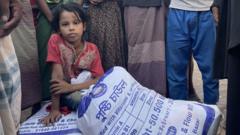Kajol, a 17-year-old garment factory worker and sole provider for her family, contracted tuberculosis (TB) in January. USAID's support initially kept her alive, but with recent cuts in aid from the Trump administration, her treatment has been jeopardized. TB, a highly contagious disease, poses a significant threat in impoverished areas like Mohammadpur, Dhaka.
Local initiatives such as Nari Maitree, which relied on USAID funding for over three years, have been crucial in diagnosing and treating TB, but they are now forced to cease operations due to financial shortfalls. This situation has left patients like Kajol vulnerable as they struggle to access necessary medications and follow-up care without assistance.
Statistics illustrate the impact of USAID support: in 2023 alone, the agency helped identify over 250,000 new TB cases in Bangladesh. Without continuous aid, the nation's fight against TB, once largely effective, is now at risk. Asif Saleh from the non-profit BRAC remarks on the essential role of USAID, indicating its significant contributions to public health strategies and overall disease management in Bangladesh.
The aid drastically slashed from $500 million in 2024 to just $71 million this year has led to the suspension of numerous programs funded directly by USAID, affecting not only healthcare but also the livelihoods of many workers. Dipa Halder, an activist with Nari Maitree, recounts the emotional toll as she loses her job, just as many others are facing job insecurity in the extractive NGO sector.
The situation grows even more critical in places like Cox's Bazar, home to over one million Rohingya refugees who wholly depend on international assistance. With the decline of USAID contributions, essential services have dwindled, further exacerbating humanitarian needs. Rana Flowers from UNICEF warns of impending crises, including outbreaks of disease and security challenges stemming from desperation among the refugee population.
The cuts signal a broader trend of reduced foreign aid globally, as similar actions have been observed by other nations. In Bangladesh, leaders are left scrambling to devise a new plan amidst a fractured economy and increased inflation, raising concerns over how these changes will affect vulnerable populations, including women and children, in the immediate future. The reality remains stark: without urgent reinstatement of aid, the survival of many will be profoundly at risk.























